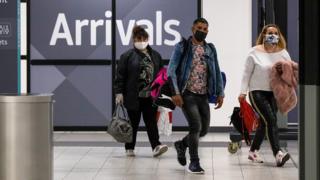Holiday firms in fresh plea over 2-week flight quarantine plans
 Image copyright Getty Images
Image copyright Getty Images A group of 200 travel companies has written to Home Secretary Priti Patel asking for current quarantine plans for people entering the UK to be scrapped.
It follows calls last week from MPs and travel bosses to reconsider the rules.
From 8 June, people entering the UK from abroad will be told to isolate for 14 days.
The letter suggests travel should be possible for people – without quarantine – between destinations «deemed safe from coronavirus».
So-called air bridges would allow visitors from countries where coronavirus infection rates are low into the UK, without having to self-isolate for two weeks.
The lead author of the letter, George Morgan-Grenville, boss of tour operator Red Savannah, said: «This is not just a group of company bosses complaining, but employees from bottom to top calling for the quarantine plans to be quashed.»
£1,000 fine
Other firms and travel bosses who have signed include hotelier Sir Rocco Forte, hotels The Ritz, The Connaught and Mandarin Oriental, and upmarket travel agent Kuoni.
Last month, in a letter to the prime minister, bosses of airlines such as EasyJet, Tui, Jet2 and Virgin Atlantic, as well as industry bodies Airlines UK, the British Chambers of Commerce, UK Hospitality and manufacturing association Make UK said that while they fully support the government’s commitment to public health, they have «serious reservations» about a «blanket approach» to all arrivals into Britain.
Passengers arriving in the UK by plane, ferry or train – including UK nationals – will have to provide an address where they will remain for 14 days. There is a £100 penalty for anyone found to have not filled in this »contact locator» form.
Surprise visits will be used to check they are following the rules. Those in England could be fined up to £1,000 if they fail to self-isolate, while governments in Scotland, Wales and Northern Ireland can also impose penalties.
Passengers will be asked to drive in their own car to their destination, where possible. If they do not provide an address, the government will arrange accommodation.
They must then not go to work, school, or public areas, or use public transport or taxis. They should also not have any visitors unless they are providing essential support, and should not go out to buy food or other essentials where they can rely on others.

